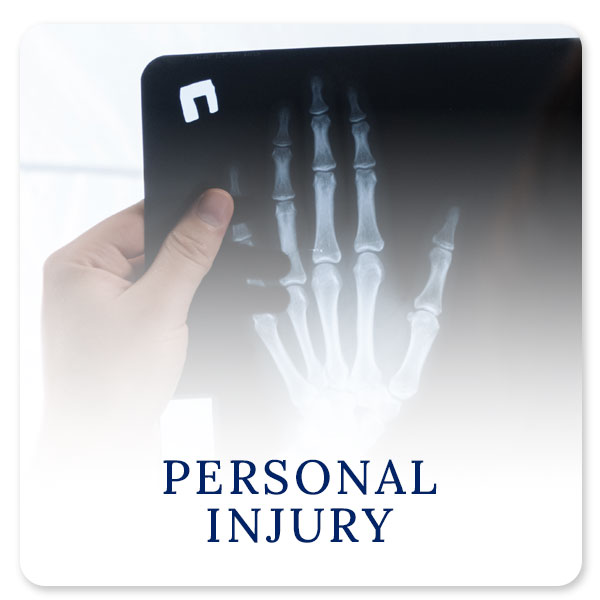AREAS OF LAW
Our dedicated staff provides a personal approach to each case. The Law Office of Amy Martel carefully choose their medical negligence cases and personally handles each one.
Personal Injury
A personal injury occurs when one party’s negligence or misconduct results in an injury to another party. If you believe another party is responsible for an injury or economic loss you recently suffered, you may have a personal injury case.
Medical Malpractice
Unfortunately, doctors, nurses and hospitals make medical mistakes and when someone suffers a serious injury because they fail to practice medicine to the acceptable standard of care, those mistakes are considered malpractice. These can include diagnostic errors, medication errors, surgical errors, anesthesia errors or nursing erros. If you were injured during a medical procedure, surgery, medical evaluation, or treatment due to the negligence of a doctor, nurse, or another medical professional, you may have the right to seek compensation.
Birth Injury
Birth injury is a type of medical malpractice and is any physical injury that occurs during pregnancy or delivery to the mother and/or the child she is carrying or delivering. Examples of birth injuries that may be related to medical negligence include:
- Failing to detect fetal distress and/or properly monitor the baby’s heartbeat
- Failing to prevent or treat severe tearing or bleeding in the mother
- Failing to perform a medically necessary C-section (cesarean section)
- Improperly using forceps or vacuum delivery or failing to inform mother of their risks
- Pulling or twisting too hard on the baby as they exit the birth canal
Medical negligence can still happen even after the child has been delivered. Once a child is born, medical professionals must monitor the baby and mother for any complications that may arise. Type of injuries that may arise in the postpartum period include:
- Failing to control blood loss of the mother and/or baby
- Failing to diagnose and treat newborn jaundice
- Failing to monitor the baby’s vital signs
- Failing to treat the mother’s uterine ruptures and/or tears
All of these actions can lead to severe complications for the mother and child. However, the statute of limitations may differ for the mother and her child therefore it is important to consult a medical malpractice attorney as soon as practical.
Wrongful Death
Wrongful death cases are simply personal injury cases in which the victim died from the injuries suffered due to someone else’s negligence. Some of the types of wrongful death cases could include the following: car accident, medical negligence, work place injuries, products liability and pedestrian and bicycle accidents. This is not a complete list of all the possible ways for a wrongful death to occur. Ultimately, if you believe another party bears responsibility for the death of your loved one, you may have grounds to file a wrongful death claim.
Failure to Diagnose
Failure to diagnose occurs when a physician fails to timely diagnose a patient’s condition. Misdiagnosis results from a doctor making an incorrect diagnosis. A delayed diagnosis takes place when a medical professional significantly delays a correct diagnosis. These are three common forms of medical negligence. These cases may involve a failure to diagnose cancer or other serious illnesses, a missed diagnosis, a delayed diagnosis, delayed treatment, or a failure to recognize complications that change or aggravate an existing condition.
Kaiser Arbitrations
Kaiser Permanente is the largest health insurance provider in California. Just like any other medical care provider, Kaiser Permanente’s health care providers can and do make mistakes in the treatment of patients. However, because of the terms of the Kaiser Permanente HMO agreement, many patients have given up their right to sue Kaiser in Court. Kaiser requires its patients to agree to the specific Arbitration system designed by, and for, Kaiser. Kaiser has a tremendous amount of control over the Arbitration system and they set their own rules when it comes to medical malpractice claims. If you are insured by Kaiser, you want a firm on your side that has experience with the Kaiser system.
Motor Vehicle Accident
A car accident can change your life in an instant. If you or someone you love have suffered injuries in a car crash, you want an attorney on your side who will make sure you get the financial compensation you deserve.
Slip & Fall
If you are injured as a result of a fall on someone elses property you may be able to seek financial compensation. Property owners are expected to maintain their properties appropriately and address known safety issues in a timely manner. If a property owner discovers any safety hazard that could foreseeably cause an injury to a guest, the property owner has a responsibility to fix the problem or, warn guests of the hazard.
Premise and Products
Liability Building managers, landlords and other property owners have a responsibility to maintain a safe environment for anyone who may pass through. If you have been injured in unsafe conditions in a retail establishment, private residence or public space, you can hold the negligent property owner responsible and protect your rights.
What is medical negligence
The law of office of Amy Martel specializes in medical negligence cases.
Doctors, nurses, hospitals and other health care professionals act negligently when they fail to provide the quality of care that other reasonably competent doctors would have provided under similar circumstances. Errors by medical professionals can arise in virtually any setting however, these errors can occur even when everything is done properly. Therefore, to prove medical negligence the patient must show that the mistake/error fell below the appropriate standard of care and that they were injured as a direct result. In other words, disappointment with the results of a procedure does not form a basis for a medical malpractice claim, nor does a mistake that caused no real harm to the patient.
For a patient to prevail on a medical negligence claim the patient must prove:
- A doctor-patient relationship was established between you and the medical professional you wish to sue;
- The doctor was negligent in providing treatment;
- The doctor’s negligence caused an injury to the patient;
- The patient’s injuries led to actual damages, such as past and/or future medical bills, emotional distress, loss of income.
In medical malpractice lawsuits, patients have the burden of proving all four elements. To prove negligence a patient must prove what care other reasonably competent doctors would have provided in similar circumstances. This usually requires expert testimony. To establish this we will hire a doctor or other healthcare practitioner that has experience with the type of medical problem at issue in the case. The doctor provides an opinion regarding what a reasonably competent doctor would have done under the circumstances and how that care would have changed the outcome. The patient must prove actual harm, not merely show a potential for harm.
In order to win damages in a medical malpractice case patients must also prove that their doctors’ negligence caused foreseeable harm. This harm can take many forms, including pain and suffering, cost of medical bills, loss of earning capacity, and loss of the ability to enjoy life’s pleasures in the same way as prior to the harm.









